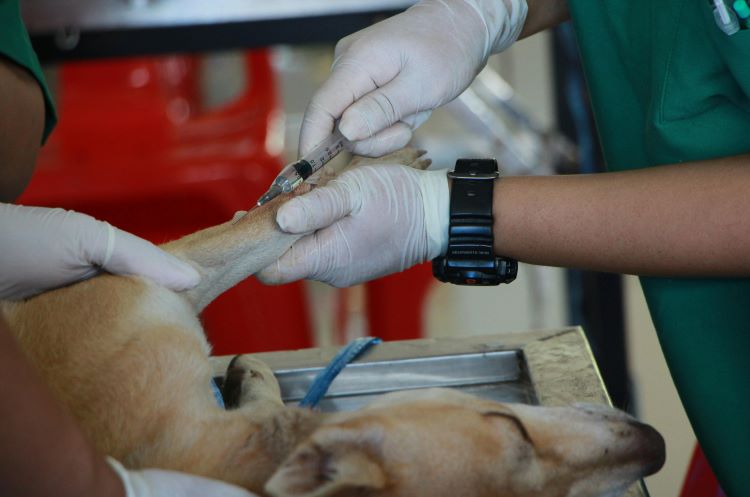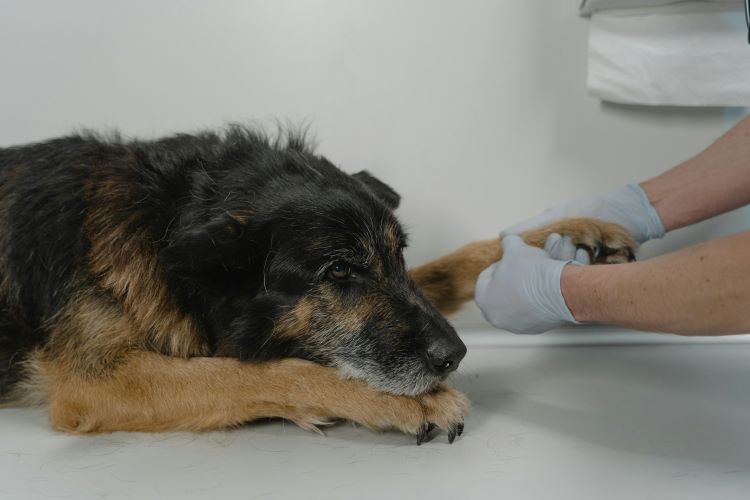Ready to help treat your pet to a healthy life?
What Shots do Dogs Need? A Canine Vaccine Guide
By : Kathleen Crampton & Trupanion Staff | Published Aug 19, 2025

Prioritizing your pet’s health and safety should always be a top priority. As a pet parent, you likely puppy-proof your home, think twice before leaving your dog in the car unattended, and take care to keep them well-groomed. But, this may come as no surprise — one of the first lines of defense in protecting your pet is getting them vaccinated. Whether you’re a new pet owner or are simply curious about canine vaccines, you may be wondering, what shots do dogs actually need?
Remember that some dogs may be at risk of things that others are at lesser risk for. Your pup’s veterinarian will therefore have the best insights into your dog’s vaccine schedule and the shots that are best for their particular lifestyle, health, and age.
That said, it never hurts to become more informed. Let’s take a look at which shots are needed and when, discover which ones aren’t considered essential, and get answers to other commonly asked questions regarding dog vaccinations.
Why dogs need vaccines
The short answer: protection. Canine vaccines, like feline vaccines, give your dog the best chance of warding off certain diseases — or at least not developing serious, life-threatening symptoms.
While no vaccine provides 100% immunity or protection, every little bit helps. Most vaccines work by introducing the weakened or inactive form of the virus or disease to your pup’s immune system, motivating the development of antibodies that can recognize and fight the disease if they encounter it in the future. Still, canine vaccinations don’t just protect your dog — they contribute to herd immunity and can even keep certain diseases from being transmitted to humans. In other words? It’s best for everyone in the family for your dog to stay current on their vaccines.
Core vaccines vs. non-core vaccines
Now, let’s get to the key question: What shots do dogs need? The American Animal Hospital Association (AAHA) sets guidelines for animal vaccinations, including those for canines, and separates dog vaccines into two categories: core and non-core. Understanding the difference between these is key to knowing which kinds of vaccines may be required for your pup vs. which ones are just recommended.
Core vaccines for dogs
Core vaccines are typically required as initial doses for puppies and booster shots for adult dogs. The AAHA defines core vaccines as those “recommended for all dogs irrespective of lifestyle, unless there is a specific medical reason not to vaccinate.” These required vaccines protect dogs from contagious and potentially deadly diseases and even prevent them from passing certain diseases to humans.
In North America, these are considered core vaccines for dogs:
1. Canine distemper virus (CDV)*
This is a very contagious virus that affects a dog’s respiratory, gastrointestinal, and nervous systems.
2. Canine adenovirus (CAV)*
CAV is also known as infectious canine hepatitis and causes inflammation in the liver. CAV type 2 is the core vaccine, as it cross-protects against type 1. However, type 1 can also be included in the vaccination schedule.
3. Canine parvovirus (CPV)*
Commonly known as “parvo,” this virus is highly contagious, targeting white blood cells and potentially damaging the gastrointestinal tract and even the heart. The CPV type 2 vaccine protects against all three known variants of CPV.
4. Rabies
This highly fatal disease poses a health risk to both animals and humans. So, it may come as no surprise the rabies vaccine is required by law in most states. It is also the only legally required vaccine for dogs in Canada.
5. Leptospira
Many dogs are susceptible to infections from the Leptospira bacteria that may be present in certain water and soil. The AAHA is divided on if this should be considered one of the core vaccines vs. non-core vaccines. While its guidance leaves the decision up to veterinarians, it does list leptospira as a core vaccine.
*CDV, CAV, and CPV are commonly administered as a combined dose to minimize the number of injections. Sometimes, the canine parainfluenza virus vaccine is added to this dose to become what is called the DHPP vaccine.
Non-core vaccines for dogs
Non-core vaccines may not be required, but they could be recommended depending on your dog’s lifestyle, risk of exposure, and geographic location. Discuss with your veterinarian whether some of these vaccines could be helpful for your furry companion as a way to protect them from certain illnesses.
1. Canine parainfluenza virus (CPIV)
Often known as “kennel cough,” (though this really refers to several viral and bacterial illnesses) CPIV is a very contagious respiratory virus that can spread quickly in highly populated areas, like kennels, doggie daycares, and shelters.
2. Bordetella bronchiseptica
“Kennel cough” can also be due to this bacterial infection, which causes a dry cough, sneezing, and, in severe cases, pneumonia. This vaccine can be combined in a single dose with the CPIV vaccine.
3. Canine influenza virus (CIV)
This vaccine helps protect against the two main strains of CIV in North America: H3N8/H3N2. CIV is also a respiratory virus that resembles CPIV, but it requires a separate vaccine. And, yes, if you guessed that kennel cough can refer to this one as well, you’d be right!
4. Canine Borrelia burgdorferi
Commonly known as the Lyme disease vaccine, this can add an extra layer of protection, along with tick-preventative measures, for dogs that travel to or live in areas where there are ticks carrying the disease.
5. Rattlesnake toxoid (Crotalus atrox)
This vaccine may help to boost a dog’s immunity against the deadly Western Diamondback Rattlesnake venom. However, the AAHA cautions vets and pet parents about the efficacy issues and lack of peer-reviewed publications regarding this vaccine. Additionally, as of April 2025, the US Department of Agriculture has suspended the rattlesnake toxoid vaccine as a result.

Dog vaccination schedule
Dog vaccinations and timing vary by age, risk level, lifestyle, and location. But there is a general timeline that can be used as a reference point. As always, speak with your veterinarian to determine the best dog vaccine schedule for your pup.
Note that the puppy vaccine schedule doesn’t begin until about six weeks old. That’s because newborn puppies have some immunity from their mother’s milk, which decreases as the weeks go by. They’ll lose the maternal immunity once they’re weaned, making vaccines at this age very important.
Puppy (6 to 16 weeks old)
- 6-8 weeks:
- DHPP (CDV, CAV, CPV, CPIV), first round
- Optional: Bordetella bronchiseptica
- 9-11 weeks:
- DHPP (CDV, CAV, CPV, CPIV), second round
- Canine Borrelia burgdorferi, first round
- 12-14 weeks:
- DHPP (CDV, CAV, CPV, CPIV), third round
- Leptospira, first round
- Canine Borrelia burgdorferi, second round
- Optional: CIV, first round
- 15-16 weeks:
- Rabies (varies by state, but most states require dogs to have rabies vaccinations by the time they’re four months old)
- Leptospira, second round
- Optional: DHPP (CDV, CAV, CPV, CPIV), fourth round
- Optional: CIV, second round
- Optional: Rattlesnake toxoid (16 weeks is generally considered the earliest age to receive this vaccine)
Adolescent dog (around 1.5 years old)
- One year after last dose of initial vaccination series:
- DHPP booster
- Leptospira booster
- Canine Borrelia burgdorferi booster
- CIV booster
- Rabies booster*
- Annually:
- Bordetella bronchiseptica booster
Adult dog (1.5 to 7 years old)
- Every three years:
- DHPP booster
- Rabies booster*
- Annually:
- Bordetella bronchiseptica booster
- CIV booster
- Leptospira booster
- Canine Borrelia burgdorferi booster
Senior dog (7+ years old)
- Every three years:
- DHPP booster
- Rabies booster*
- Annually:
- Bordetella bronchiseptica booster
- CIV booster
- Leptospira booster
- Canine Borrelia burgdorferi booster
*Ensure that you follow your state’s guidelines regarding rabies vaccines and boosters. In many states, the first rabies booster is administered one year after the initial dose, and remaining boosters are administered every three years.

Common dog vaccine FAQs
If you still have pressing questions about canine vaccinations, these answers to common FAQs can help. Use this as a reference point, consulting your veterinarian about any specific questions or concerns you may have.
Do dogs really need yearly vaccinations?
Yes, pups should receive the required yearly vaccinations according to their dog vaccine schedule. Not all vaccine boosters are administered annually, though. Some, like DHPP and rabies, may only be required every three years. Consult with your veterinarian about which shots your dog needs and when.
What is the ‘5 in 1’ vaccine for dogs?
DHPP is also known as the “5 in 1” vaccine because it includes five vaccines in one combined dose: canine distemper virus, canine adenovirus (types 1 and 2), canine parvovirus, and canine parainfluenza virus. Now, these vaccines can be administered separately, but they’re commonly combined into one shot for convenience and to minimize the number of times your dog has to get pricked.
How much do dog vaccines cost?
The exact cost of each dog vaccine depends on the type of vaccine and where you get the shots. Generally speaking, each vaccine might range from $20 to $100.
Costs can add up, especially when paired with other types of preventive care and testing. To ease the financial burden and get more dogs vaccinated, some local shelters, humane societies, and animal control services offer low-cost vaccination clinics. You can check your local county or city animal welfare organizations to see if this is an option.
Protect your dog beyond routine vaccines
Vaccinations are just one part of keeping your dog healthy. While pet insurance typically doesn’t cover the cost of vaccines and other routine care, it can help your furry best friend receive treatment for certain illnesses, breed-specific conditions, and more. Get your dog the care they need with dog insurance so that they stay healthy, thriving, and ready for any adventure.
